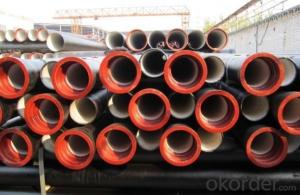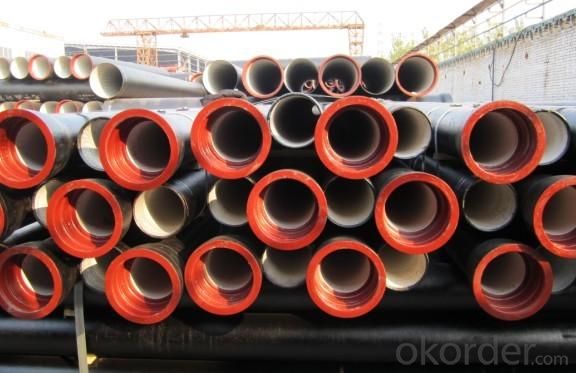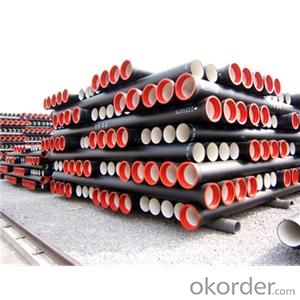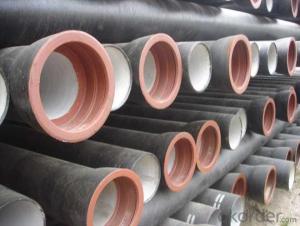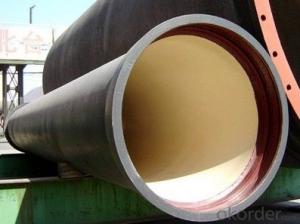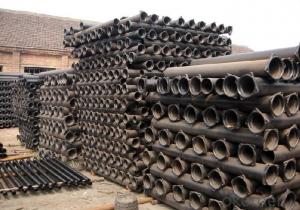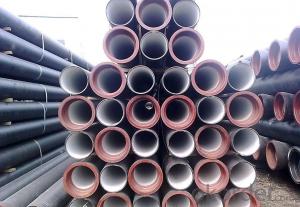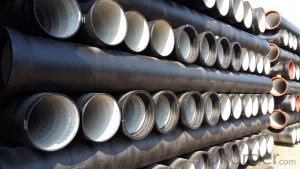Ductile Iron Pipe of China DN300-DN900 EN598 C40 On Sale
- Loading Port:
- China main port
- Payment Terms:
- TT or LC
- Min Order Qty:
- 20 m.t.
- Supply Capability:
- 100000 m.t./month
OKorder Service Pledge
OKorder Financial Service
You Might Also Like
1,Ductile Iron Pipe Description :
1) Pipes confirm to ISO2531,K9 class,T type joint,6m long,with inside cements lining conform to ISO4179, outside Zinc spraying(130g/m2) and bitumen coating(70μm) conform to ISO8179.
2) Pipe ends: Spigot and socket ends, with 100% SBR rubber gaskets accoding to ISO4633
3) we can do third party inspection according to customer's request.
4) Our products have been sold to many international market,such as Middle East and South East Asia and Africa.
2,Main Features of the Ductile Iron Pipe:
·High yield strength
·High tensile Strength
·High corrosion resistance
·Pressure Resistence
·Anti-corrosion
·Installation is convenient
·Satisfy the highest hygienic standards
3,Ductile Iron Pipe Images:
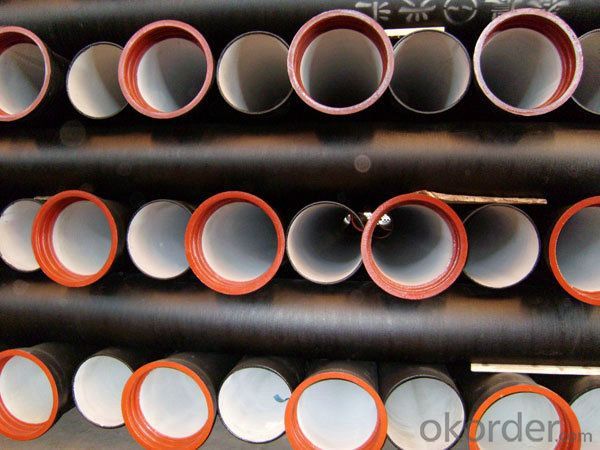
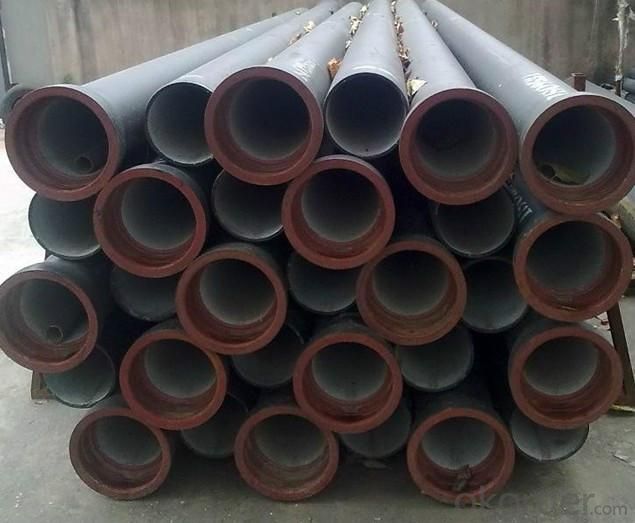
4. Ductile Iron Pipe Specification
Quick Details
Place of Origin: China (Mainland)
Model Number: DN80-1600 Length: 6M/5.7M/NEGOTIATED Standard: ISO2531 / EN545
Application: Potable/Sewage Water
Diameter: DN80-1600
Shape: Round
Hardness: 230 Pipe
Wall Thickness: standerd
Pull Strength: 420
Yield (≥ MPa): 300
Material: Ductile Iron water ductile iron pipe: SO2531 / EN545 DI pipe
Packaging & Delivery
Delivery Detail: 30-45 days
ductile iron pipe:
1. DN80-DN1600mm (T-Type, Class K9)
2.effective length 6m/pc
3.comply with ISO2531/EN545/EN598
5.FAQ:
We have organized several common questions for our clients,may help you sincerely:
1.Q: Why would you choose ductile iron pipe rather than other pipe materials?
A:The reasons are obvious for that not only ductile iron pipe possesses the inherent strength and flexibility of ductile iron, combined with proven corrosion protection systems, but also the cost savings can be achieved from design to installation and commissioning.
2.Q:Why can you guarantee the inner of pipes can’t be corroded?
A: High alumina cement mortar lining and sulphate-resistant cement mortar lining. These two special linings are applicable to inner anti-corrosion for sewage pipes, improving resistance to erosion of the sewage components.
- Q: What is cast iron pipe, specification for cast iron pipe?
- According to the different casting methods, the labor intensity is divided into continuous cast iron pipes and centrifugal cast iron pipes, in which the centrifugal cast iron pipes are divided into two kinds: sand mould and metal mould. Divided into gray cast iron pipe and nodular cast iron pipe according to different material. Rubber ring seals for flexible interfaces,
- Q: Can ductile iron pipes be used for pressure relief systems?
- Yes, ductile iron pipes can be used for pressure relief systems. Ductile iron pipes are known for their strength, durability, and ability to withstand high pressure conditions. They have a high resistance to internal and external pressures, making them suitable for use in pressure relief systems. Additionally, ductile iron pipes can handle significant changes in pressure without compromising their structural integrity. Therefore, they are commonly used in applications where pressure relief systems are required, such as water supply networks, wastewater treatment plants, and industrial processes.
- Q: Can ductile iron pipes be used for agricultural applications?
- Yes, ductile iron pipes can be used for agricultural applications. Ductile iron pipes are known for their durability, strength, and corrosion resistance, making them suitable for various agricultural applications such as irrigation systems, water supply networks, and drainage systems.
- Q: What are the typical joint restraint requirements for ductile iron pipes under pressure?
- In order to meet the joint restraint requirements for ductile iron pipes under pressure, there are two common options available: mechanical joint restraints and restrained joint systems. These restraints are essential to prevent separation or pulling apart of the pipes caused by internal pressure. A mechanical joint restraint, which is widely used, involves a series of bolts and clamps that securely hold the pipes together. These restraints are applied at each joint of the ductile iron pipes to ensure a tight and secure connection. By providing axial restraint, they prevent the pipes from separating along the pipe axis. Another option is the restrained joint system, which offers both axial and angular restraint. This system includes a specially designed joint that consists of a gasket, a restraining gland, and a series of bolts or wedges. The gasket ensures a watertight seal, while the restraining gland and bolts/wedges restrain the pipe joints, preventing separation under pressure. The specific requirements for joint restraints may vary depending on factors such as the pipe's diameter, wall thickness, and operating conditions. To determine the appropriate joint restraint system for a specific application, it is crucial to consult the manufacturer's guidelines and industry standards. Furthermore, proper installation and maintenance of the joint restraints are essential to ensure their effectiveness and longevity in restraining the pipes.
- Q: How does ductile iron pipe perform in areas with high soil consolidation?
- Ductile iron pipe performs exceptionally well in areas with high soil consolidation. The inherent strength and flexibility of ductile iron make it a suitable choice for underground installations where the soil tends to consolidate, or settle, over time. In areas with high soil consolidation, the ground often experiences significant movement and settling, which can pose challenges for buried infrastructure. However, ductile iron pipe's unique characteristics enable it to withstand these conditions. Firstly, ductile iron has a high tensile strength, which means it can resist external forces and pressures exerted by the surrounding soil. This strength allows the pipe to maintain its structural integrity even in areas with high soil consolidation. Secondly, ductile iron is highly resistant to deformation and can handle ground movement without cracking or breaking. The pipe's flexibility allows it to absorb the lateral forces associated with soil consolidation and prevents it from being damaged. Additionally, ductile iron pipe is known for its durability and long service life. It is resistant to corrosion, abrasion, and chemical attacks, further enhancing its performance in areas with high soil consolidation. This resistance ensures that the pipe remains intact and functional, even in challenging soil conditions. Moreover, ductile iron pipe's joints are designed to provide a secure and leak-free connection. This eliminates the risk of soil infiltration, which can potentially worsen soil consolidation and lead to further ground movement. In summary, ductile iron pipe performs exceptionally well in areas with high soil consolidation due to its strength, flexibility, durability, and leak-free joints. Its ability to withstand ground movement and maintain its structural integrity makes it a reliable option for underground installations in such conditions.
- Q: Are ductile iron pipes suitable for airport runway drainage?
- Yes, ductile iron pipes are suitable for airport runway drainage. Ductile iron pipes are known for their durability, strength, and resistance to corrosion, making them an ideal choice for handling heavy loads and withstanding harsh environmental conditions typically found on airport runways.
- Q: What are the different accessories available for ductile iron pipe?
- There are several accessories available for ductile iron pipe, including but not limited to, flange adaptors, couplings, valves, fittings, joint restraints, gaskets, and tapping sleeves. These accessories help in connecting, repairing, and maintaining ductile iron pipe systems.
- Q: Is the crankshaft material forged or ductile iron?
- Nodular cast iron, cast iron, forged steel crankshaft are used in the three. There are 3 kinds of axes in our company
- Q: Ductile iron pipe, socket connection, pipe length, you can cut open it?
- Yes, but the pipe that needs cutting is a cut off pipe with a scissors mark.
- Q: Can ductile iron pipe be used for power plant cooling water systems?
- Yes, ductile iron pipe can be used for power plant cooling water systems. Ductile iron pipe is known for its high strength and durability, which makes it suitable for various applications, including cooling water systems in power plants. It has excellent corrosion resistance, making it resistant to the corrosive effects of water and chemicals commonly found in cooling water systems. Additionally, ductile iron pipe has a smooth interior surface that minimizes friction loss and allows for efficient water flow. These characteristics make ductile iron pipe a reliable and cost-effective choice for power plant cooling water systems.
Send your message to us
Ductile Iron Pipe of China DN300-DN900 EN598 C40 On Sale
- Loading Port:
- China main port
- Payment Terms:
- TT or LC
- Min Order Qty:
- 20 m.t.
- Supply Capability:
- 100000 m.t./month
OKorder Service Pledge
OKorder Financial Service
Similar products
Hot products
Hot Searches
Related keywords
